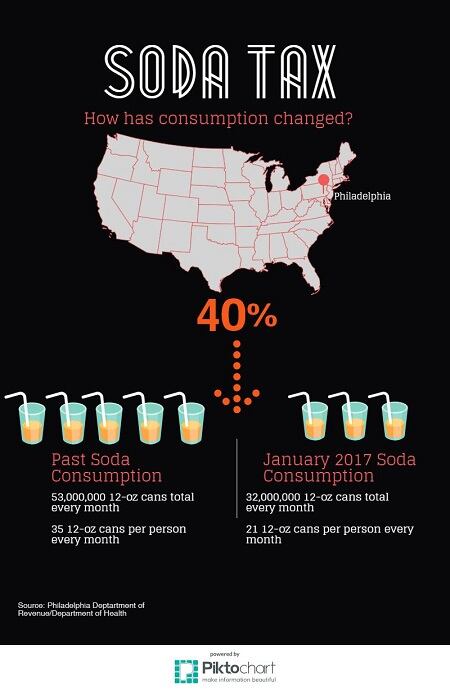The 1.5-cent-per-ounce Philadelphia soda tax went into effect January 2017. Cook County, Illinois, also approved a soda tax that will go into effect July 1, 2017. Other US locations including Boulder, Colorado, and three cities in California: Albany, Oakland, and San Francisco have also passed a similar tax legislation.

Broken down soda tax revenue
The $5.7m of city revenue translates into roughly 32m 12-ounce cans, meaning that each of Philadelphia’s 1.5m residents drank an average of 21 sugary beverages last month.
According to recent data from the city of Philadelphia’s public health department, residents consume an average of 60m gallons of sugar-sweetened beverages annually, which equals to roughly 53m 12-ounce cans per month or 35 cans per person every month, marking a nearly 40% decline in average consumption.
Philadelphia Mayor Jim Kenney said that the soda industry “makes enormous profits on the backs of poor people” and estimates that the soda tax could generate up to $91m in revenue, which would go towards the city’s education programs and expanding pre-kindergarten opportunities for lower-income residents.
Philadelphia officials also said that the tax would reduce healthcare costs by $200m and 700 lives in the treatment of diabetes over the next ten years, according to a Harvard Study.
Coalition says soda tax hurts local business
Ax the Bev Tax Coalition, an organization engaged in the local community, said that the “steep drop-off in sales” will only get worst and hurt the Philadelphia community.
Mexico study finds soda tax does deter sales
A study conducted by the University of North Carolina at Chapel Hill found that a tax on sugar in Mexico was effective in curbing consumption of sugar-sweetened beverages in stores. Authors of the study pulled from date on beverages purchases by 6,253 households between January 2012 and December 2014.
Purchases of taxed sugary beverages decreased by an average of 6% in 2012, and rose to a decline 14% of sales by December 2014.
“Regardless of how much money the administration says it collected in the first month of this tax, the pain Philadelphia families and businesses are feeling is very real. The beverage tax is causing prices on thousands of items to skyrocket, sending shoppers outside the city and forcing steep declines in sales,” the coalition said in a statement.
“This steep drop-off in sales is already causing layoffs and a reduction in hours in family-sustaining, union jobs. For the working families paying drastically higher prices and the businesses impacted by the tax, the pain is only going to worsen over time.”
ABA holding strong against soda tax
The American Beverage Association (ABA) has been fighting the soda tax (called the Sweetened Beverage Act or SBT) in the Philadelphia County Court of Common Pleas, on the grounds that it is unconstitutional and that it adds to a sales tax already imposed on soda and sugary beverages.
The ABA also funded and formed a coalition called the Philadelphians Against the Grocery Store Tax made up of business owners, teachers, and faith organizations, who said in survey that 58% of Philadelphia residents oppose the tax.
Consumers experience sticker shock
While 33 US states already have a sales tax associated with sugar-sweetened beverages, the SBT per ounce surcharge can add up to a 50% additional tax as evidenced by the following receipts from Philadelphia retail stores.
Chicago has sights set on filling budget deficit
In Cook County, which includes the city of Chicago, a penny-per-ounce soda tax was passed and is expected to generate $74m in 2017 once it goes into effect July 1st. Officials hope it will put a dent in $174.3m county deficit.
The tax applies to all sugar and artificially-sweetened drinks including fountain drinks, carbonated soft drinks, energy drinks, and fruit beverages.
However, families in the Supplemental Nutrition Assistance Program will not be affected by the additional tax.
"I don’t think that soda is a staple for every family, and I would be concerned if people were drinking soda all the time," Cook County Commissioner Larry Suffredin said during the approval process of the soda tax.
"This is not gasoline we’re talking about. It’s a consumption tax. It’s a specific product."
